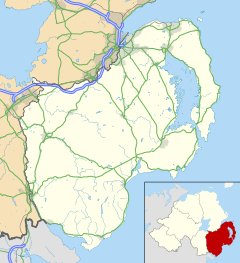Gilford, County Down
| Gilford | |
|---|---|
 The old Gilford Mill | |
Location within County Down | |
| District | |
| County | |
| Country | Northern Ireland |
| Sovereign state | United Kingdom |


Gilford is a village in County Down, Northern Ireland. The village sits on the River Bann between the towns of Banbridge, Tandragee and Portadown. It covers the townlands of Loughans, Ballymacanallen and Drumaran. It had a population of 1,933 people in the 2011 census. Gilford is within the Armagh, Banbridge and Craigavon district.
History
[edit]Following the Irish Rebellion of 1641, Captain John Magill acquired land in the parish of Tullylish and founded Gilford,[citation needed] the name of the village being derived from "Magill’s ford".[2] He afterwards became Sir John Magill and built Gill Hall in Dromore, County Down.[3]
The Magill lands passed by marriage to the Meade family, who were made Barons Gillford in 1766 and later earls of Clanwilliam. In the 19th century, Gilford grew and its population swelled when a linen mill was built. Many mill houses can still be found in the village. When the mill shut in 1986, the village waned. Recently though, the village has started to recover and new shops have opened. At the edge of the village is Gilford Castle, a mansion built in 1865[2] to the designs of architect William Spence.
Tanderagee and Gilford railway station was opened in 1852 to serve the villages closing in 1965.[4]
Education
[edit]There are two schools in the area: Gilford Primary School and St John's Primary School. The schools are within the Southern Education and Library Board area. There is a nursery located in Gilford Primary School.
Sport
[edit]The local GAA club serving Gilford is Tullylish GAC, with its home ground, Páirc na nÓg. Tullylish GAC represents the broader Tullylish area, including the communities of Gilford, Tullylish, Clare, and Laurencetown. The club actively competes in the County Down Leagues and offers a comprehensive structure for Gaelic football, with teams available from under 6 to senior levels. For hurling and camogie, Aghaderg Gaelic Athletic & Ballyvarley Hurling Club serves as the nearest club that offers those codes, and is located approximately three miles from Gilford.
Gilford Boxing Club has produced a number of All-Ireland winners.[citation needed] It is situated in the old church hall beside Gilford chapel.
Gilford Crusaders Football Club play in Division 3 of the Mid-Ulster Football League.
Millpark Cricket Club was a cricket club in Gilford, County Down, that last played in Section 2 of the NCU Senior League. The club, originally based at Millpark, an area located between Gilford and Banbridge, moved the short distance to its second and final home Banford Green, in 1969.[1] In 2017, the club merged with Donaghcloney Cricket Club under the name Donaghcloney Mill Cricket Club
Gilford Angling Club.
Dunbarton Bowling Club is based in Gilford and is one of the most respected clubs in the bowling scene throughout the island of Ireland.
Demography
[edit]Gilford is classified as a village by the Northern Ireland Statistics and Research Agency (NISRA) (i.e. with population between 1,000 and 2,250 people). On census day 2001 (29 April 2001) there were 1,573 people living in Gilford. Of these:[citation needed]
- 22.7% were aged under 16 and 14.6% were aged 60 and over
- 50.2% of the population were male and 49.8% were female
- 51.0% were from a Catholic background and 47.0% were from a Protestant background
- 3.8% of people aged 16–74 were unemployed.
People
[edit]- Charlie Gallogly (1919–1993) was a professional footballer in England
- Jude Hill (b. 2010), child actor known for his lead role in Kenneth Branagh's film Belfast (2021).
References
[edit]- ^ Gilford Archived 11 August 2019 at the Wayback Machine. Placenames Database of Ireland.
- ^ a b "Gilford". Culture Northern Ireland. Archived from the original on 9 June 2008. Retrieved 7 September 2010.
- ^ "Place Names NI". Archived from the original on 11 August 2019. Retrieved 11 August 2019.
- ^ "Tandragee station" (PDF). Railscot - Irish Railways. Archived (PDF) from the original on 2 March 2011. Retrieved 24 November 2007.


